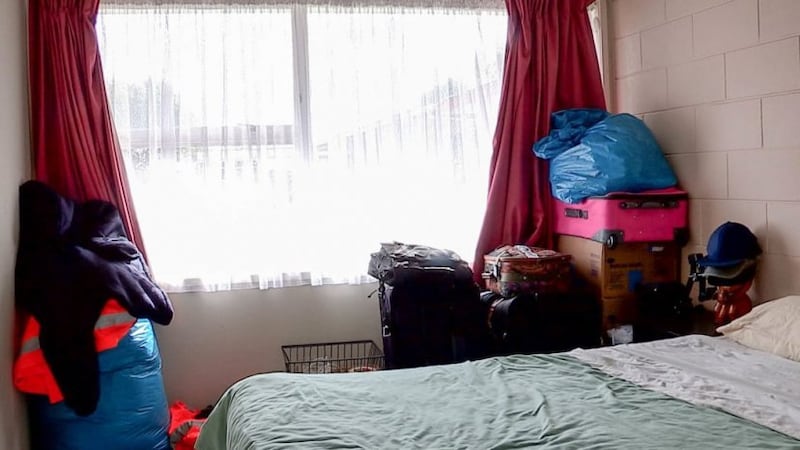Documents indicate that some Rotorua hotels that provide emergency housing have been targeting potential out-of-town customers via social media. Photo / RNZ / File / Cole Eastham-Farrelly
Some motels providing emergency housing in Rotorua have directly targeted potential clients from out of town through social media.
A document shared by RotoruaNZ with Rotorua Lakes Council - aimed at informing "messaging" to the government in March 2022 - shows examples of emergency housing motel advertisements on Facebook directly targeted at people in Tauranga and Whakatāne.
Those advertising in Tauranga and Whakatāne were live at the time the document was produced.
The document, written by RotoruaNZ chief executive Andrew Wilson and research and insights manager Justin Kimberley, said the emergency housing system facilitated by the Ministry of Social Development (MSD) had enabled accommodation providers to directly advertise to potential clients through channels such as Facebook Marketplace.
"This has resulted in a large number of Rotorua motels (approximately 50-60) being either solely emergency housing or mixed-use," the document said.
"As a city reliant on tourism - both international and domestic - we have suffered considerable reputational damage from this.
"The data also suggests that a large number of emergency housing recipients were previously not located in Rotorua," the document claimed.
It said most of the data the document drew on was from an MSD official information response and statistics on the Ministry of Housing and Urban Development website.
A RotoruaNZ spokesperson said the document's purpose was to shine a light on "the need for central government to provide targeted support packages".
Information obtained under official information law also revealed in March this year RotoruaNZ chief executive Andrew Wilson met MSD representatives, including Bay of Plenty regional commissioner Mike Bryant, at the RotoruaNZ office.
According to Wilson's recollection of the meeting, motels advertising emergency housing spots on Facebook were raised, as well as data about how many emergency housing clients had come from outside of Rotorua.
Wilson's recollection was that Bryant said he would follow up with properties advertising on Facebook but debated the interpretation of the data on out-of-towners.
Wilson advised Bryant that MSD data was not readily available to RotoruaNZ and required an official information request every time it required information.
A follow-up email from Bryant to Wilson said MSD had identified four motels that were advertising outside Rotorua for long-term stays, and the ministry had "requested they stop doing that and will follow up with a letter".
He asked Wilson to pass on any further examples of the practice.
Bryant said two surveys had "confirmed the majority of people accommodated in emergency housing in Rotorua were from Rotorua".
A further meeting in July, which included Wilson, representatives from Rotorua Lakes Council and the Bay of Plenty Regional Council, Te Pokapū, Visions of a Helping Hand, Lifewise, the then-Lakes District Health Board and government agencies including MSD, was held at Four Canoes motel.
According to Wilson's recollection, he had briefly summarised "the city is taking very large hit from an economic perspective given the reputational issues which is leading to less visitation, resulting in [fewer] jobs and subsequently making Rotorua a less desirable place to live and work".
He also said the city was in a "perilous cycle" and it was becoming "increasingly harder to back out of".
"If we don't get the management of the properties right, significant harm is caused across the entire wellbeing spectrum."
It was Wilson's recollection Bryant suggested the reputational problems were a result of "people talking badly about the city".
In the same month Bryant, speaking at a Rotorua Lakes Council meeting, said there were "people that complain about everything" and that MSD did not "really enjoy working with negative people".
The May before that meeting, it was revealed one-third of the 120 family harm calls a week in Rotorua were to emergency housing motels, a statement made by a senior council official showed.
On Friday, 28 October, RotoruaNZ chief executive Andrew Wilson said advertising for MSD clients out of town was problematic and it would "only exacerbate the issues we are facing in relation to emergency housing".
"Bringing more people to Rotorua when there is no suitable accommodation available is not helpful for anyone."
Wilson said he understood the practice was continuing but said putting an end to the practice would not address "the bigger issue around how the process of motel use for emergency housing is managed".
"Because of the current processes, people will still be able to come from outside of Rotorua and stay in motels whether or not they have a connection or support here."
Wilson's comments and recollections of the meetings were put to Bryant.
On Wednesday last week, Bryant told Local Democracy Reporting that as recently as 1 November MSD had contacted a Rotorua motel about a Facebook post advertising emergency housing to out-of-towners and "asked that they remind their staff not to do it".
"When we know a Rotorua motel is advertising emergency housing in out-of-town social media groups, we reach out and ask them to stop."
Bryant said it had been an "occasional problem over the years" which sometimes still happened.
"Our impression is that it's declined over time.
"We're in regular contact with emergency housing suppliers and we value our relationship with them, so a conversation is usually all it takes."
Bryant was asked whether there were specific enforceable advertising rules in place for motels providing emergency housing and he said because the motels were private businesses and MSD did not hold contracts with them the issue was not covered.
"However, it's our policy to ask for a valid and clear reason before any emergency housing support is provided for people to relocate from outside of their region.
"It's not fair if social media posts mislead people about this, and that's generally understood by the suppliers we choose to work with."
A motel known to have made some of the ads targeting out-of-towners was approached for comment.


